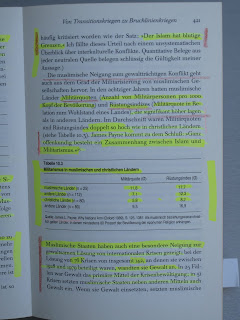Zur Geschichtsschreibung mußte man erst einmal schreiben können; die Schrift ermöglichte das kulturelle Gedächtnis.
Die antiken Perser wollten mehrmals die griechischen (hellenischen) Stämme unterwerfen. Herodot (ca. 490-430 vuZ), mit Thukydides (454-396) ein Vater der Geschichtsschreibung, schildert das in den “Historien”. In der Historie 144 im 8. Buch läßt er die Athener dem Gesandten der Perser (“Medes”) und vor allem den Spartanern erwidern: (in Englisch, weil die dt. Version 20mal so teuer und nicht kopierbar ist):
“... the spirit of the Athenians, namely that there is neither so great quantity of gold anywhere upon the earth, nor any land so much excelling in beauty and goodness, that we should be willing to accept it and enslave Hellas by taking the side of the Medes. For many and great are the reasons which hinder us from doing this, even though we should desire it; first and greatest the images and houses of the gods set on fire or reduced to ruin, which we must necessarily avenge to the very utmost rather than make an agreement with him who did these deeds; then secondly there is the bond of Hellenic race, by which we are of one blood and of one speech, the common temples of the gods and the common sacrifices, the manners of life which are the same for all; to these it would not be well that the Athenians should become traitors. And be assured of this, if by any chance ye were not assured of it before, that so long as one of the Athenians remains alive, we will never make an agreement with Xerxes. We admire however the forethought which ye had with regard to us, in that ye took thought for us who have had our substance destroyed, and are willing to support the members of our households; and so far as ye are concerned, the kindness has been fully performed: but we shall continue to endure as we may, and not be a trouble in any way to you. Now therefore, with full conviction this is so, send out an army as speedily as ye may: for, as we conjecture, the Barbarian will be here invading our land at no far distant time but so soon as he shall be informed of the message sent, namely that we shall do none of those things which he desired of us. Therefore before he arrives here in Attica, it is fitting that ye come to our rescue quickly in Boeotia." Thus the Athenians made answer, and upon that the envoys went away back to Sparta.
Herodotus. Herodotus: The Histories (S.803-804). Titan Read. Kindle-Version.
Gemeinsame Religion, gemeinsame Sprache, gemeinsame Abstammung (Ethnizität), gemeinsame Lebensweise - das sind die Kriterien der Athener, die sie die persische Sklaverei verwerfen lassen. Irgendwie ist das vielleicht auch heute nicht völlig überholt.






